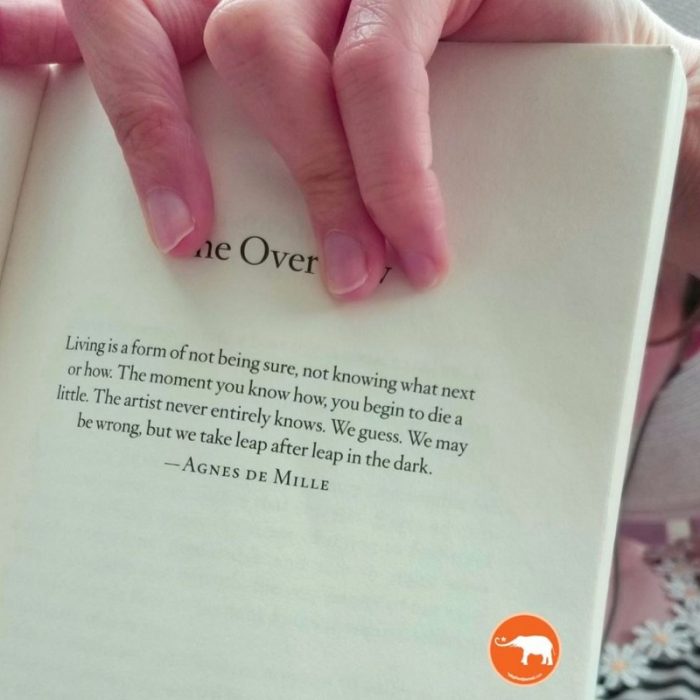Hello, Elephant Academy Book Club readers!
Hard to believe it’s been an entire month since we introduced the club and our first book. We made sure to leave several weeks so that readers and alumni of the Elephant Academy would have ample time to track down a copy of the book and begin reading.
If you haven’t heard, we’re reading “Living Beautifully with Uncertainty and Change” by Pema Chödrön and you’re welcome to jump in at any time. In fact, please do! The more the merrier.
My own copy of the book is beginning to show signs of, shall we say, character? Since beginning the book it has been tossed in and out of purses and tote bags. It’s been rained on. I’ve penciled notes in the margins and left stars where I fell in love with a particular line of text. I’ve creased the cover. In short? I’ve given this book a story, and I find myself chuckling that as I was unknowingly shaping a story for this item I was attempting to step out of my own story, my own ego, my own fears, even if for just a few precious seconds.
Not long ago I had the book with me in my bag when I met a friend for happy hour. The local pub wasn’t busy yet and we were able to snag a sidewalk table. I don’t remember what we were talking about, but something caused me to reach into my bag, pull out the book, and toss it on the table for my friend to see. I remember my laughter echoing down the street we sat on because this book was so perfectly aligned with the conversation. Something to do with, you know—uncertainty and change.
I forgot the book was on the table until later when the bartender came out to bring us refills and commented on it. Have no fear—he says it’s wonderful! He’s reading another at the moment, but he has it on random in his iTunes so chapters come up every now and then unexpectedly. Somehow I think Pema would approve.
But that day with the book and the bartender and my friend? That gave the book a story. It gave it a shared history, and it validated somehow how necessary a resource like this is in today’s world. We’re all just one happy hour glass of wine away from finding another like-minded, mindful human. We just have to put our cards (or book) on the table.
And so, on to the book. These thoughts of mine are based on the first two chapters in what is termed as “The Overview.”
In my mind, Pema and I are old friends. Opening a book she has written is like being invited to sit down for a cuppa and being offered a plate of warm jam thumbprint cookies. Her words are like honeyed tea, warm and sweet as they go down. Each sentence gives the impression that it was written for me and me alone. Anyone else have that sense?
In these first pages of the book, we’re drawn into a discussion of “The Fundamental Ambiguity of Being Human.” Umm. Okay. Ambiguity, if we want to pull this apart a little, can be defined as “the quality of being open to more than one interpretation” or “inexactness.” So what she’s saying here is really—”the inexactness of being a human being.”
Great.
Because adulting wasn’t already hard enough without my dear friend Pema and her tea and cookies making me anxious about it.
Wait.
Oh, f*ck. That was the point, wasn’t it?
“Our discomfort arises from all of our efforts to put ground under our feet, to realize our dream of constant okayness. When we resist change, it’s called suffering. But when we can completely let go and not struggle against it, when we can embrace the groundlessness of our situation and relax into its dynamic quality, that’s called enlightenment, or awakening to our true nature, to our fundamental goodness. Another word for that is freedom—freedom from struggling against the fundamental ambiguity of being human.” ~ Pema Chödrön, Living Beautifully: with Uncertainty and Change
This paragraph: I flinched. I balked. I resisted, I really did—for all of about 30 seconds until I had to admit to myself that I agreed with this entirely, but it was out of fear that I was balking.
Is constant okayness really so bad?
Molly: 0
Pema: 1
It seems that she was anticipating this resistance, because she goes on to talk about the ego, about denial, and about our own self-created fixed identity.
Feeling as though my skirt was caught in my underwear, I had spinach stuck in my teeth, or any of a dozen other other such embarrassing situations, I read on.
Did you know that an emotion lasts just 90 seconds? If you’ve read chapter two of the book, you do. If you haven’t, you really need to stop reading my words and go read her words because I won’t do them justice.
Honestly.
Why are you still reading?
Molly: 0
Pema: 2
My fixed identity and my ego may never be the same after this book. Inside this cover and not too many pages in is an exercise to bring your focus back to the present moment. She speaks to us about being present and learning to release the story surrounding an emotion after the natural 90 seconds.
As I read, I envisioned myself stepping into a moment, feeling the emotion, and watching it slip out of my fingers again as the moment passed. Ninety seconds is an eternity within the present moment, but a mere drop in the metaphorical bucket of our lives.
Now I want to make that vision a reality.
I’ve challenged myself to take moments of frustration or of anger and walk into them, face them, and let them go. Who’s with me? Who’s with me and willing to be present even when it hurts? To notice in our physical bodies where you feel sensation. To feel it change. And to remember not to dwell.
If you’re game to take on this challenge as we continue reading this book, leave a comment on this blog letting us know or share an experience you’ve had since that speaks to this challenge.
Methods to participate in The Elephant Academy Book Club:
>> Post images of your book or you + your book to your Instagram feed. Use the hashtags #elephantacademybookclub #elephantacademy #elephantalumni (if you’re an alum!) and we may feature you!
>> Reply to this blog by leaving a comment with any reflections you have about the book thus far.
>> Leave a comment on this blog and us know if you’ll be joining Molly in choosing to mindfully be present in situations of anger or frustration.
>> Write your own reflection article on the section of the book called “The Overview” and publish it immediately on Elephant:Now! Share the link so we can all read.
>> Leave a comment with your favorite/most impactful quote from the book.
Next we’ll read chapter 3. Stay tuned!


 Share on bsky
Share on bsky





Read 1 comment and reply